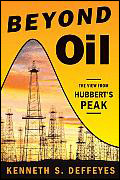oil
-
Despite falling sales figures, it’s not bloody likely
... asked the title of an Agence France-Presse story in TerraDaily on Sunday.
Uh, not bloody likely.
The story cited falling SUV sales figures for August, combined with the even higher-than-usual gas-price spikes wrought by the hurricane's effect on refining capacity, and concluded, via an economist or two, "Potentially, Katrina could signal the death knell of the SUV in as much as consumers are going to find themselves once burned, twice shy to buy such vehicles."
But that's assuming a lot, not the least of which is that consumers make their vehicle-buying -- and especially SUV-buying -- decisions based purely on economics. Ignoring the fact that many Americans go into debt or spend beyond their means to drive the vehicle they believe best defines them as a person, or the vehicle they may one day need versus what would work for them most of the time, the theory sounds more feasible.
What I'd like to see, of course, is the widespread divorce of people from their vehicles, period ... something just as likely as the demise of the SUV. Also ignoring cultural factors, this wise shift could be based solely on economics as well. With rising, largely Lance Armstrong-fueled, bicycle sales in the U.S., coupled with ever-rising gas prices, and growing frustration with insurance companies of all kinds, I forecast a two-wheeled American transportation wise-up, quick-like.
-
Are fuel-efficiency standards a smart way to reduce oil consumption?
Fareed Zakaria has a nice rundown of the many ways our hunger for oil distorts our foreign policy and makes a mockery of our efforts to fight terrorism and spread democracy. At the end, he briefly mentions solutions:
It's true that there is no silver bullet that will entirely solve America's energy problem, but there is one that goes a long way: more-efficient cars. If American cars averaged 40 miles per gallon, we would soon reduce consumption by 2 million to 3 million barrels of oil a day. That could translate into a sustained price drop of more than $20 a barrel. ... I would start by raising fuel-efficiency standards, providing incentives for hybrids and making gasoline somewhat more expensive (yes, that means raising taxes).
Matt Yglesias thinks that fuel-efficiency (CAFE) standards -- however beloved by greens and progressives -- are a bit of a red herring:
-
The latest solution to pumped-up prices
Because I'm obsessed with reactions to gas prices, I shall tell you about an email I got this morning from a childhood friend in Maine. Maybe you've also gotten it. But not from my friend, a sweet woman who usually forwards the Ann-Landers messages: you know, a poem reminding you to love your kids and scratch behind your dog's ears, because tomorrow you might all be dead, that sort of thing.
Today's note is about a campaign to "force a price war" by not buying gas from ExxonMobil. The thinking goes that once they feel the sting, they'll have to lower prices below $2, and everyone else will follow suit. Hmm ...
The most interesting part (to wonky ol' me) was this line: "Since we all rely on our cars, we can't just stop buying gas." Sigh. In a breakdown of an older version of this chain letter and an explanation of why it will never, ever work, Break the Chain slips in this bit of finger-wagging: "If you want to save money at the pump, slow down on the freeway, plan outings to get everything in one trip, walk more, and trade in that gas-guzzling SUV for an economical compact car for starters."
-
Drivers panic at the pump
Are rising gas prices driving some people to the brink? Late last week, a station attendant in Alabama was run over and killed while trying to stop a dude from stealing $52 worth of gas. (The driver just turned himself in.) And today, on my new favorite web feature "Gas Gripes," a woman reports that her credit card was stolen and used to buy not a TV or a diamond ring, but -- you guessed it -- gas.
I was going to be all delicate and say you couldn't draw a trend from such isolated events. But behold, the glory of the web. An AP story on MSNBC today bears the headline, "Rising gasoline prices spur thefts, violence." And if the AP says it, it must be true. (Right, Pat?)
Last year, sneaky drivers made off with an astonishing $237 million in stolen gas, the story says. A spokesman for the National Association of Convenience Stores (whose site offers tips for preventing gas theft) had this to say: "As the price of gas climbs, people's values decline."
-
Bidding a fond farewell to ExxonMobil CEO Lee Raymond
Exxon Valdez: No, your other left! Photo: NOAA. Lee, we barely knew ye. Oh, wait, yes we did. “You either retire or die and I’d just as soon not die,” you said recently, and then yesterday announced your imminent exit as chair and CEO of ExxonMobil after more than 40 years with the oil behemoth. […]
-
Umbra on oil subsidies
Dear Umbra, Grist keeps mentioning that the U.S. government gives large subsidies to oil companies, but doesn’t go further into what these subsidies are. I can’t make a good argument against the government’s subsidizing Big Oil if I don’t know more about it: Are the subsidies tax breaks, and if so, for what? Are the […]
-
Going down with the ship
Lee Raymond, chairman and chief executive of Exxon Mobil, has decided that global warming is bunk and that his company is not going to waste time or money funding renewable energy.
Openly and unapologetically, the world's No. 1 oil company disputes the notion that fossil fuels are the main cause of global warming. Along with the Bush administration, Exxon opposes the Kyoto accord and the very idea of capping global-warming emissions. Congress is debating an energy bill that may be amended to include a cap, but the administration and Exxon say the costs would be huge and the benefits uncertain. Exxon also contributes money to think tanks and other groups that agree with its stance.
You kinda have to admire the guy:
"We're not playing the issue. I'm not sure I can say that about others," Lee Raymond, Exxon's chairman and chief executive, said in a recent interview at Exxon headquarters in Irving, Texas. "I get this question a lot of times: 'Why don't you just go spend $50 million on solar cells? Charge it off to the public-affairs budget and just say it's like another dry hole?' The answer is: That's not the way we do things."
At least he's not fudging.
-
Kenneth Deffeyes’ Beyond Oil forecasts a fast-approaching petroleum peak
Mark your calendar: annual world production of crude oil will reach its peak this coming Thanksgiving, Nov. 24. At least, that's the tongue-half-in-cheek prediction of Kenneth Deffeyes, who starts his latest book by suggesting that readers stop and give thanks for a century of plentiful supplies.
-
Why can’t we change our oil-sucking land-use preferences?
 The other day I expressed disappointment at Kevin Drum's fifth peak oil post -- the one where he lays out his recommendations for oil policy. In my inimitably oblique and unfocused way, I was simply trying to say that I wish he'd been more imaginative.
The other day I expressed disappointment at Kevin Drum's fifth peak oil post -- the one where he lays out his recommendations for oil policy. In my inimitably oblique and unfocused way, I was simply trying to say that I wish he'd been more imaginative.If nothing else, peak oil is going to be a major inflection point in our collective history. It's a sharp turn in the road, and we can't see clearly around the bend. The stakes are huge, and call for a commensurate greatness of mind and expansiveness of thought.
What Drum did is basically gather the conventional wisdom in one place, without considering at all the myriad ways that the CW might be constricted and warped by the vested interests of society's current power brokers. Nor did he deign to consider things that might seem, in the current sociopolitical scene, impossible, or at least out on the fringe.
One example: U.S. suburbia, as Kunstler never tires of telling us, is built on cheap oil. It takes lots of oil to transport goods around the world to a Wal-Mart, and lots of oil for suburbanites to drive back and forth to it bazillions of times. The dominant land-use paradigm in this country is oil-sucking. If oil's running out, it's got to change, right?
Drum doesn't bother to mention the many innovative thinkers out there pondering how we can make cities greener and more attractive (the very subject of World Environment Day). He doesn't consider how we might refashion our remaining farm land and open spaces in more ecologically friendly fashion. He doesn't consider how we might encourage people to buy locally grown food and locally made goods.
Instead, we get this extraordinarily banal post on why people don't like mixed-use developments. (See also the Atrios post that preceded it and the Jim Henley post responding to it.)
It's late, so I'll just make two brief points:

